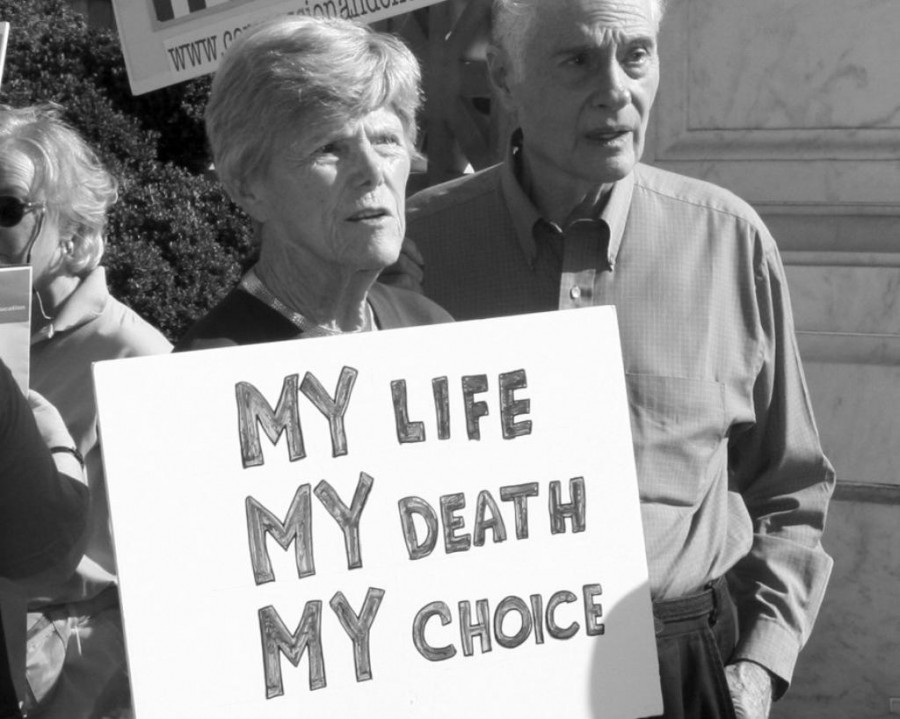
Photo courtesy of eideard.com: Patients campaign for the Death with Dignity Act.
(11-16-16) Should psychiatrists participate in euthanizing individuals with mental illnesses?
A Maryland psychiatrist, author and popular blogger, is raising an alarm about the role of psychiatry in the growing number of “Death with Dignity” laws being adopted across the nation. On Tuesday, the District of Columbia joined six states in approving laws that allow doctors to prescribe fatal drugs to terminally ill residents so that they can choose to end their lives.
Dr. Annette Hanson, co-author of the recently released book, COMMITTED, contacted me before the D.C. vote to explain why she believes assisted suicide laws may have unintended consequences when it comes to persons with mental illnesses or brain disorders such as dementia. In an email, she wrote:
I first became alarmed after California created the first law to mandate that public institutions must provide fatal care. (Title 9 of the California Code of Regulations, Section 4601, requires state psychiatric hospitals to provide assisted suicide services to seriously mentally ill patients) Upon receipt of a court order, a hospital must facilitate a patient’s suicide and even carry out the death on site. Doctors who refuse to participate could face fines or even incarceration for contempt of court.
These laws will have a devastating effect on efforts to care for very sick people. Some psychotic people refuse psychiatric medication because they believe the pills are poison—now there is a valid reason for that belief. Trust is essential to provide care to these patients, and the knowledge that the hospital helps people kill themselves would destroy that trust.
The bill approved by the D.C. City Council on Nov. 15th would allow terminally ill patients with less than six months to live to request fatal drugs from a physician after consulting a doctor over two weeks, with two witnesses attesting that the decision is voluntary. Patients must ingest the medication themselves without the assistance of doctor or family members, and physicians can refer them to counseling if they think their judgment is impaired.
Writes Dr. Hanson:
In theory most of these regulations would apply only to those with potentially terminal conditions, but there is no requirement that the patient attempt any treatment at all before requesting suicide—even low risk, proven, life-saving medical care… A physically healthy psychiatric patient is allowed to make an oral request for assisted suicide. Once denied, he or she is then allowed to request a judicial hearing on the issue. This will create the opportunity for a test case to expand assisted suicide on the basis of mental illness alone under the Americans with Disabilities Act. There is faction within the right-to-die movement that favor this.
The D.C. bill faced opposition from advocates for the disabled who said they fear people will be steered to premature death, as well as from medical professionals who say it violates the Hippocratic oath, the Washington Post reported. It was supported by groups such as the Final Exit Network which states on its website:
We believe in death with dignity and an individual’s right to self determination. We are the only organization that publicly provides education on all end of life choices as well as a compassionate presence to those who are suffering from incurable diseases and have chosen to end their suffering. We do not put an artificial requirement for an individual to be certified as likely to die in six months. Suffering does not recognize that restriction and neither do we.
Those opposed to assisted suicide point to Belgium, where 41% of people with mental disorders who die of euthanasia are killed by their own psychiatrist, and where old age, autism, and bereavement are considered valid reasons to die.
In an opinion piece entitled, Europe’s morality crisis: Euthanizing the mentally ill, published in the Washington Post, Charles Lane noted that Belgium residents are now beginning to see how Death with Dignity laws have been used to euthanize persons with mental illnesses.
“The euthanasia of people with mental illnesses or cognitive disorders, including dementia, is now a common occurrence in Belgium and the Netherlands…Recent newspaper articles and documentaries focused on cases in which psychiatrists euthanized or offered to euthanize people with mental illnesses, some still in their 20s or 30s, under dubious circumstances.
In December, 65 Belgian mental-health professionals, ethicists and physicians published a call to ban euthanasia of the mentally ill.
Lane noted that Belgian officials reported that:
Over the past two years (doctors) administered lethal injections upon the request of five non-terminally ill people with schizophrenia, five with autism, eight with bipolar disorder and 29 with dementia — an increasingly common condition in the aging Western world — as well as 39 with depression.
Defenders of Belgium’s system said that a mandatory one-month waiting period is sufficient to protect persons from being euthanized without their consent. But opponents claim that individuals with a serious mental illnesses or brain disorders such as dementia might be incapable of making such a decision.
Is Belgium really a path we want to follow? asks Hanson, who has has testified against assisted suicide legislation before the Maryland legislature and has played a role in discussions being held by the American Psychiatric Association.
The APA, as well as the American Medical Association, consider assisted suicide and euthanasia to be “fundamentally incompatible with the physician’s role as healer” and are opposed to the practices.
In addition to D.C., physician assisted death bills have been authorized in Oregon, Washington state, Vermont, California and Colorado. Technicality: assisted suicide isn’t legal in Montana. A doctor can still be charged with homicide, but can raise victim consent as a legal defense. Therefore the state is counted among those who allow Death with Dignity.



